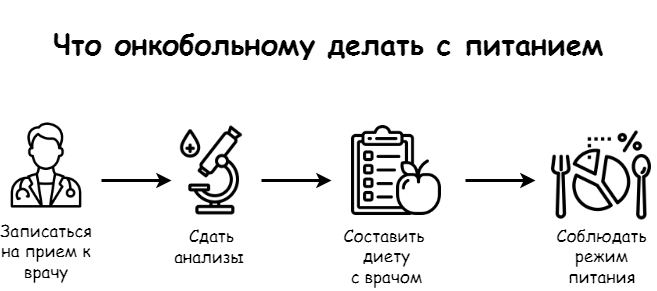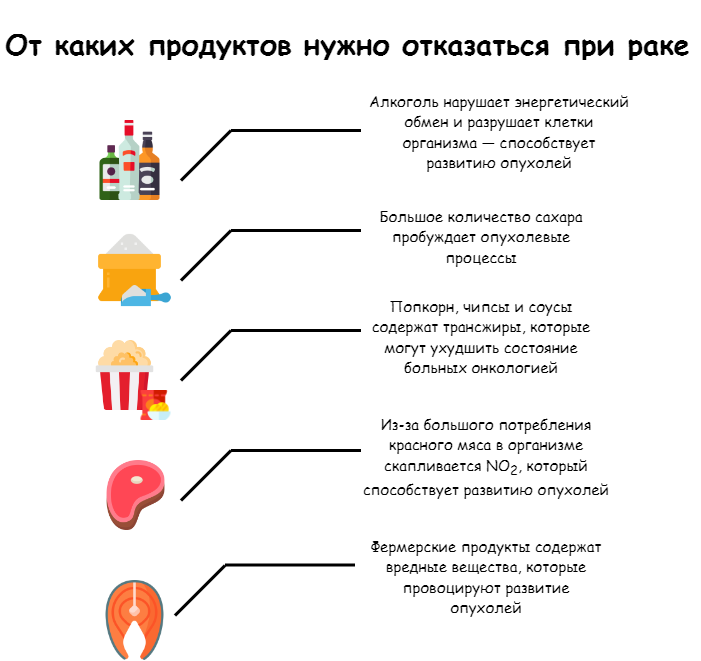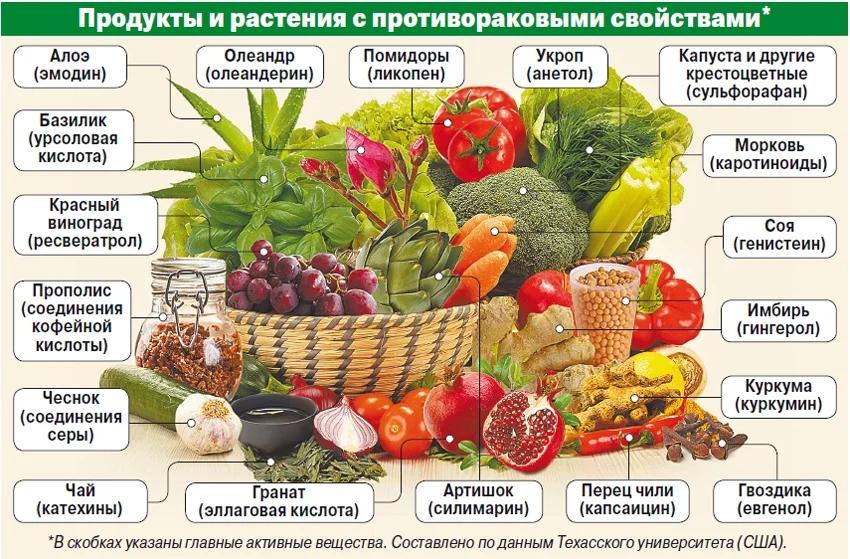One of the main conditions for the recovery of cancer patients is a healthy diet. In medicine, this field is called onconutritionology. We will explain how the cancer diet improves the patient's well-being and speak about food you should consume.
Onconutritionology is a field of medicine that helps treat and prevent cancer. The nutritionist at the Onco.Rehab clinic makes up a healthy diet without the harmful foods that negatively affect the body and reduce its resistance to tumours.
A healthy diet is one of the treatment principles in oncology.human body with tumours needs more energy and protein.
Cancer, in fact, accelerates oxidative processes. Complex substances break down into simple ones more quickly and release a lot of energy. In addition, oxidative processes damage body cells: they disrupt cell division processes and contribute to their death or mutation.
Cancer cells also absorb most of the energy that is released during the substances' decay. The body does not receive enough energy to maintain normal life. Moreover, cancer is often treated with chemotherapy, which kills tumour cells while significantly weakening the body at the same time.
That is why the cancer diet is aimed at providing the body with the necessary nutrients and energy to fight tumours.
Nutritional support helps determine the meal plan for cancer. This is a type of therapeutic nutrition that provides the body with necessary nutrients through special mixtures. The nutritional support is actually a part of onconutrition.
To provide nutritional support, it is necessary to evaluate the patient's nutritional status, select an adequate method of nutrient administration, and get the patient's response to the therapy. Let's take a closer look at each step.
Evaluation of the nutritional status. It includes the assessment of the body mass index (BMI), which is the ratio of weight to height squared. BMI shows the body status of patients: obesity, underweight, or normal weight.
Another evaluation parameter is a malnutrition score. An Onco.Rehab specialist checks the patient's diet, monitors weight changes, checks the amount of subcutaneous fat and muscle mass, and records many other important markers.
At last, the nutritionist decides how to adjust the nutrition for cancer. For example, to increase or decrease the amount of certain products, eliminate certain foods, or cook them it in a certain way.
Selection of an adequate method of nutrient administration. There are two ways of nutrition administration: enteral and parenteral.
The administration method depends on the patient’s condition. If he/she feels well and can swallow food, he/she is fed through the mouth. If the patient is in critical condition and cannot eat, the parenteral diet is prescribed.
Response to the therapy.The doctor checks the patient’s body weight and carries out laboratory tests. These parameters show how the diet affects the person. They also help adjust the nutrition for cancer to have a greater effect.

A healthy diet boosts the immunity, improves physical and psychological conditions, and affects metabolic processes in the body. Diet also aids in the recovery of patients following tumour removal.
The fact is that food contains proteins, fats and carbohydrates, which help build body cells, maintain cellular barriers to protect the body against harmful factors, and accumulate energy.
The food also contains vitamins and micronutrients that help fight external infections and restore damaged cells.
The importance of nutrition is in its ability to support the functioning of various body systems: the gastrointestinal tract, kidneys, liver, etc.
For example, a lack of carbohydrates leads to the reduction of gastrointestinal motility. As a result, food is processed and absorbed more slowly and accumulates in the gastrointestinal tract. Low protein content causes the liver's size to increase and disrupts its functioning.
Due to malnutrition, body cells are destroyed.When the body does not get enough proteins, fats or carbohydrates, it begins to use the accumulated energy. This depletes the reserves and causes a person to lose weight → feel worse → cope with illnesses less well. A Lack of vitamins and trace elements negatively affects the body’s ability to restore damaged cells and structures.
As a result, cancer becomes more malignant.
Onconutrition and a healthy diet are parts of integrative oncology, the field in cancer treatment that uses a combination of conventional, innovative, and supportive methods.
The Onco.Rehab clinic combines domestic tumour treatment protocols and modern integrative methodologies, which are actively used in cancer clinics in South Korea, Germany, Italy, Switzerland, and other countries with a high lifespan and remission rate.
If you want to cure cancer, you will have to correct your diet and follow the rules of onconutrition. Right now you can remove food categories that are harmful even for healthy people.
Products that are contraindicated for you.If something causes nausea, vomiting, or discomfort, do not consume it. For example, these symptoms may occur during chemotherapy because of products that contain a lot of fiber, such as legumes, nuts, and fresh vegetables.
If products recommended by your nutritionist cause discomfort, ask the doctor to find an alternative.

Alcohol.Alcohol negatively affects your brain, blood vessels and other parts of your body. It disturbs energy metabolism, changes the way nerve cells function, and destroys liver cells Therefore, at least during the therapy, it is worth following an alcohol-free diet to make onconutritionology methods more effective.
Food high in sugar.You needn’t avoid sugar completely, as it is a source of glucose and energy for the body. But a large amount of sugar can do harm:
Sugar substitutes.Plos Medicine journal found that aspartame and acesulfame potassium, which are found in sweeteners and some foods, contribute to the development of cancer up to stage IV.
Popcorn, potato chips, mayonnaise, and ketchup. They contain trans fats which are formed during heating or some chemical processes during production. They raise cholesterol levels in the blood and the risk of cardiovascular disease and diabetes. It worsens the condition of a patient with cancer.
Farmed salmon. Farmers feed their fish unnatural food with unnatural food that contains chemicals, pesticides and other carcinogens. Salmon absorbs harmful substances which then get into the human body and trigger tumour formation.
Smoked, pickled, salted products.They contain harmful preservatives such as nitrites. Under the effect of stomach acid, they turn into nitrosamines, substances with strong carcinogenic activity.
A lot of red meat.Meat has a high content of hemoglobin, which breaks down in the body and forms nitro compounds (substances that contain NO2). These processes damage the intestinal mucosa and contribute to cancer development.
Reboiled water.Such water has an increased concentration of nitrates, dioxins and other harmful substances. In the body they turn into compounds that provoke cancer progression.
Non-organic vegetables and fruits.They are grown with the use of pesticides, herbicides and other chemicals. Some producers use hormones to make a fruit bigger. These substances accumulate in plants, as in farmed salmon, and then can provoke the occurrence and development of cancer.
Improper nutrition for cancer can also cause other conditions. For example, cirrhosis of the liver or diabetes.
It is impossible to make a universal product list that can be recommended to anyone. What can help one patient may cause eating disorders in another.
We recommend taking the food. It will help determine which dishes are contraindicated and should be avoided..
To take a cytotoxic test, contact our clinic.
Various products are used for cancer prevention. Foremost, they must contain a lot of protein, vitamins, minerals and omega-3 fatty acids.
Foods high in protein. It supports the immune system and improves cell restoration.
That is why protein should be included in the menu to help the body cope with infections and fight cancer processes. Cancer patients are recommended to consume up to 1.5 g of protein per 1 kg of body weight.
The best sources of protein are chicken, fish, eggs, and legumes.
|
Food rich in vitamins. It activates the human defence systems and recovery processes, strengthens the immune system. The table below shows what vitamins foods contain. |
|
Vitamin |
Product |
|
Vitamin A |
Beef liver, cod liver, pork liver, chicken eggs, quail eggs, butter, red carrots, dried rose hips |
|
Vitamin D |
Cod liver, caviar, fish, butter, eggs |
|
Vitamin K |
Parsley, spinach, spring onion, broccoli, white cabbage |
|
Vitamin C |
Dried rose hips, black currant, red bell pepper, sea buckthorn, Brussels sprouts, dill, gooseberries, raspberries, potatoes |
|
B vitamins |
Sunflower seeds, peas, yeast, nuts, liver |
Food rich in omega-3 fatty acids. The efficiency of omega-3 fatty acids for cancer treatment has not been proven. But in some cases they reduce the risk of colon cancer and improve the immune response. They also help people with depression, which can develop as a reaction to the main diagnosis.
Fatty acids are found in fish oil, krill oil, cod liver oil, and flaxseed oil.
Learn more about omega-3 fatty acids benefits here.
These products should be included in the diet both during and after cancer treatment.
Therapeutic nutrition should include not only healthy but also anticancer products. We talk about them in our article, Top-12 Cancer-Fighting Products. Below we briefly name them.
Leafy green vegetables. They have antibacterial and antiviral effects. Leafy vegetables inactivate carcinogens, program cancer cells to die off, and prevent tumour formation and metastasis.
Cruciferous vegetables. They protect the DNA structure from damage.
Berries.They are able to lower free radical damage. Free radicals are substances that activate oxidation processes in the body → disturb important processes of cell division, stimulate their death and mutation.
Fresh herbs and spices. Turmeric, for example, contains the active ingredient curcumin, which helps decrease the tumour's size. To learn more about the benefits of turmeric in onco nutrition, read the article "Turmeric Essential Oil Benefits Against Cancer".
Cultured dairy products. They contain microorganisms that maintain the natural bacterial balance in the intestinal microflora and help increase immunity.
Unrefined oils.They boost the immune system, support gut functioning and reduce inflammation.
Mushrooms. Mushrooms increase immunity, prevent tumour growth, and support cell regeneration.
Traditional teas. Tea inhibits cancer cell proliferation and their invasion into surrounding organs. They also inhibit metastasis and growth of blood vessels, which nourish tumours.

There are some eating rules we advise you to follow during radiation, radioactive iodine and chemotherapy:
During and after chemotherapy, your menu may include:
To create an individual diet plan, contact Onco.Rehab, the first Russian clinic of integrative oncology. Our nutritionists will help diagnose and then create a detailed diet plan for 4 and 6 months. The menu is strictly personalized and takes into account the results of current tests, condition and medical history of the cancer patient.

To get a consultation/hospitalization in OOO “Onkoklinika” you should go to the clinic residence (oncology clinic) at the place of your and take a reference (057-U) with the signature of your treating doctor and the seal of the medical organization.



The manager contacts patients just after the concilium of doctors (every Thursday) where the specialists look through all the documents and make a decision about the necessary treatment.
Medical Network